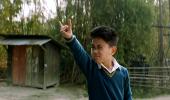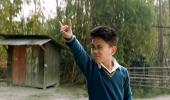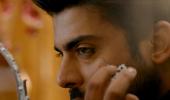'The war ended in 2009 and I believe the new generation of Tamils don't know what was going on there.'
'I felt it was my duty to tell our story.'
'Since 2009, it seems like we are sleeping.'

Tamil-French film-maker and actor Lawrence Valin is having his grand moment in film festival circuits with his debut feature, Little Jaffna.
Born in France, Valin's parents migrated to that country from Sri Lanka. He was raised by his grandmother, hearing stories about the war in Sri Lanka and the plight of the Tamil people there.
After struggling as an actor in France, Valin finally decided to write and direct his own films to narrate the stories of his people.
Little Jaffna is a follow up to a short with the same name, and was premiered at the Venice Film Festival as well as the Toronto International Film Festival. It is also included in the upcoming MAMI line-up.
A gripping thriller, Little Jaffna shines a light on the Tamil-Sri Lankan Diaspora in Paris. Its vast cast includes two Indian Tamil actors, Radhika Sarathkumar and Vela Ramamoorthy.
Valin plays the lead, Michael, a Tamil man hired as a cop in Paris. His assignment is to infiltrate the Tamil Tigers and follow the trail of money being raised and then sent to Sri Lanka.
Little Jaffna is thrilling, entertaining and a colourful representation of the Tamil community in Paris.
The film even features a boisterous scene of Michael and his friends watching a Tamil film, starring Vijay, in a Paris theatre.
It has the energy of two Cannes Film Festival winning films Mathieu Kassovitz's La Haine (1995) and Jacques Audiard's Dheepan (2015).
Valin is clearly inspired by Martin Scorsese's films.
In fact, his company is named Mean Streets, which was the title of Scorsese's 1973 film.
Valin chats with Aseem Chhabra after the screening of his film in Toronto, and says, "My mother was cleaning homes and I have not known my father since I was three. I come from the bottom, and had to climb and climb to get here."
Lawrence, before your film, Jacques Audiard made Dheepan and it is the only other Tamil-Sri Lankan film made in France. I believe you were almost cast as a lead actor in Dheepan.
I passed the audition for the main role. But after three months, they told me the lead character was going to be an older man.
Instead, they said they needed people for a picnic scene in a park and wanted to cast me.
I thought a lot and then said to myself, 'Man, I cannot do that.'
People told me that at least I could watch Jacques Audiard work and learn from him.
But my ego as an actor told me not to go.
The film went on to win the Palme d'Or in Cannes, but it was also beginning of my becoming a director.
I thought about how after Dheepan, no one else in France will make a film about Tamil people. And I was right.
I also thought that if nobody gave me a chance, I would have to create that chance myself.
So I have to thank Audiard because otherwise, I don't think I would have directed a film.
Did you act in films before that?
The offers I got were mostly stereotypical or cliched characters.
I did do small roles.
I grabbed whatever little dust they give me, and I would say okay, this is my main character.
I was always given small Indian characters because of my skin colour.
But I had put in five years of studies at the La Résidence de La Fémis to be an actor. It is one of the best schools in France.
So finally I said I cannot work like that. That's when I realised that writing was the only way for me to express myself, and create characters that I would love to play.
My final year short film The Loyal Man got selected at the Clermont-Ferrand Festival. I didn't even know that it was an important festival, but I won the Best Actor award there.
As a director, I didn't face a lot of struggle.
I managed to get my short films and this feature financed.
But before that, I struggled as an actor for 13 years. That made me become focused as a director.

I haven't seen the short film you directed called Little Jaffna , but I saw some photographs. You changed your look because you had blond hair there. You look different in the feature film.
Why did you decide to change Michael's look?
Yes, every time I had to change my way of looking, so people would not recognise me.
Because the real Lawrence that you see at film screenings is very shy.
I like to be in the shadows.
But when I am in character, that gives me power.
In this film, I had put make up on my face to make it look like I had white marks.
Yeah, that was very interesting because you were you trying to show how your character is transitioning, that Michael is partly white and French, and partly brown and Tamil, Sri Lankan.
Exactly. For me, it's very important. Also, I have a real mark on my back.
So without any dialogue, without anything to say, I put this on the screen.
The audience can see there are white spots, and two colours on Michael's face. He's French and he is Tamil.
I am like that in real life.
The makeup thing was a challenge.
The producers were nervous, but I went with it.
For the short Little Jaffna, you worked with Jesuthasan Anthonythasan, who was the lead actor in Dheepan.
Yes. He had worked with Jacques Audiard and I could direct him easily.
I also cast him in my second short The Loyal Man (2020).
But you did not cast him in your feature film.
Because then people would compare Dheepan with my feature film. I wanted my film to stand on its own.

I couldn't help but notice that there's a similarity between the story of Little Jaffna and Andrew Lau's Hong Kong-based crime trilogy Infernal Affairs (2002-2003). Because in those films also, the cop infiltrates a Chinese gang. Were you influenced by Infernal Affairs?
In the writing stage, I was influenced by Martin Scorsese's The Departed (2006).
Yes, The Departed was a remake of the Infernal Affairs trilogy.
I didn't see the original. But while writing, I wanted to explore how a man enters a community he is not a part of.
And that idea came from The Departed.
But I was also inspired by We Own the Night (2007), which was directed by James Gray.
One of the last scenes in my film is Michael looking at his grandmother and wondering where his life will go. That was inspired by Joaquim Phoenix in We Own The Night, when he says 'What's going on with my life? Am I at the right place.'
But this was only during the writing phase.
When I planned to direct the film, I was influenced by Anurag Kashyap's Gangs of Wasseypur (2012).
It was an Indian style film but at the same time, European audiences connected with it. That's very difficult thing when you have a film appreciated by Indian as well as EWestern audiences. I had to struggle to maintain a balance where the film is not just for white or Tamil people.
I grew up watching Tamil films, where you pack a punch and the guy falls 100 metrEs. And the shot is repeated. It's a double punch.
Yes, the double punch. Somebody told me in film editing it is called the Madras Cut. It was often used in Rajinikanth's and Vijay's films.
Exactly. For us, it is natural to see stars like Rajinikanth and Vijay do the double punches. And we would go, wow, that's action.
The French public would think that is comedy, but as a Tamil boy, I accepted that world of cinema. I liked the extraordinary touches of film-making.
At the same time, I grew up with French cinema too, where life can be really simple.
I wanted to put beauty in the film as well. So what you see in Little Jaffna is a blend of the two kinds of cinemas.

But despite the inspiration from The Departed, you created your own story. And you cast two Indian actors.
I wanted Radhika ma'am and Vela sir because they play important characters and have strong lines.
Young actors would not have been able to work with those lines.
It was a pleasure to work with professional actors.
I am used to working with first-time and non-trained actors, and both of them would deliver in one or two takes. They came from India and once they joined the shoot everybody felt okay, it is a professional film.
At the TIFF screening, you mentioned how in France you can make a film with Tamil characters. This is a very French film, even though 90 percent of the characters are actually Tamil.
The thing is people think that in France it's complicated. And it was complicated for me as an actor.
At the same time, they gave opportunities, otherwise I would not have become a director.
If you have a good script, they will finance your film.
In India and Sri Lanka, there are young film-makers who can tell their own stories better than I can if I made films there.
In France sometimes, I am too Indian and in India, I am too white.
In France, I have to create my own place to tell people my story in the Tamil Diaspora.
I didn't have a father or mother in the industry. My mother was cleaning homes and I have not known my father since I was three.
I was raised by my grandmother (the role Radhika Sarathkumar plays in his film).
I come from the bottom, and had to climb and climb to get here.
When you don't have role models, you have to create your own. I am a father now and have two kids.
Before I had kids, I could play an Indian guy in films. But when my daughter was born, I had to create something for her and her generation.

This is a difficult question. I know the Tamil population in Sri Lanka suffered a lot. But can there be real peace now between the Tamil and the Sinhalese people? And will there be a time when your film can be shown in Sri Lanka?
I would love to show the film there.
At the second screening in Toronto, a Tamil mother came to me and started to cry in my arms.
She said to me, 'Thank you for telling our story.'
I told her, 'Amma, I tried to keep the memories, our story alive, otherwise we will forget about it.'
The war ended in 2009 and I believe the new generation of Tamils in the Diaspora don't know what was going on there.
I felt it was my duty to tell our story.
Since 2009, it seems like we are sleeping.
I understand life has to go on.
People have to eat and everything is expensive.
But we lost so many things in this war.
I had to think about how to put light on our story, our history.
But if I had made a film only for Tamil people about the war, just a few people would have watched it.
I thought by making a thriller, adding crime and chase sequences, and the police into the mix, non-Tamils will also learn that there was a war.
I also know that if I talk about (Velupillai) Prabhakaran and the Tamil Tigers, it will be hard to show the film in Sri Lanka.
In India, some film-makers have been able to make movies about the war (A Peck on the Cheek, Madras Café) but it will be very complicated for me to take the film to Sri Lanka.











